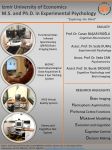
FACULTY OF ARTS AND SCIENCES
Department of Psychology
PSY 420 | Course Introduction and Application Information
| Course Name |
Neuropsychological Assessment
|
|
Code
|
Semester
|
Theory
(hour/week) |
Application/Lab
(hour/week) |
Local Credits
|
ECTS
|
|
PSY 420
|
Fall/Spring
|
3
|
0
|
3
|
6
|
| Prerequisites |
None
|
|||||
| Course Language |
English
|
|||||
| Course Type |
Elective
|
|||||
| Course Level |
First Cycle
|
|||||
| Mode of Delivery | - | |||||
| Teaching Methods and Techniques of the Course | Case StudyQ&ALecture / Presentation | |||||
| Course Coordinator | - | |||||
| Course Lecturer(s) | ||||||
| Assistant(s) | - | |||||
| Course Objectives | It is aimed to introduce students the basic concepts of neuropsychology and major structures of the central nervous system and the brain; to inform them about high cognitive functions and related brain structures; and to make them skilled in the practice of the tests that assess these functions and the interpretation of the test scores. |
| Learning Outcomes |
The students who succeeded in this course;
|
| Course Description | This course includes three essential topics of neuropsychology which are the relationship between the cognitive function and brain structure, characteristic of cognitive impairment in neuropsychiatric disorders and administration of neuropsychological tests and assessment of the results. |
|
|
Core Courses | |
| Major Area Courses |
X
|
|
| Supportive Courses | ||
| Media and Management Skills Courses | ||
| Transferable Skill Courses |
WEEKLY SUBJECTS AND RELATED PREPARATION STUDIES
| Week | Subjects | Related Preparation |
| 1 | Neuropsychology: History and Development | Beaumont, J. G. (2008). Introduction to Neuropsychology. The Guilford Press (Chapter 1: The Discipline of Neuropsychology; pp. 3-22). Kolb, B. & Whishaw I. Q. (2007). Fundamentals of Human Neuropsychology (6th ed.). Worth Publishers (Chapter 1: The Development of Neuropsychology; pp. 1-29) |
| 2 | The structure and function of the central nervous system; the structure and development of the brain | Kolb, B. & Whishaw I. Q. (2007). Fundamentals of Human Neuropsychology (6th ed). Worth Publishers (Chapter 3: Organization of the Nervous System; pp. 51-82. Schoenberg, M. R. & Scott, J. G. (2011). The Little Black Book of Neuropsychology A Syndrome-Based Approach. Springer (Chapter 3: Neuroanatomy Primer: Structure and Function of the Human Nervous System; pp. 59-127) |
| 3 | Cortical organization | Kolb, B. & Whishaw I. Q. (2007). Fundamentals of Human Neuropsychology (6th ed). Worth Publishers (Chapter 8: Organization of the Sensory Systems; pp. 197-223 & Chapter 9: Organization of the Motor System; pp. 223-245 & Chapter 10: Principles of Neocortical Function; pp. 245-276 & Chapter 11: Cerebral Asymmetry; pp. 276-309) |
| 4 | Consciousness, arousal and attention | Kolb, B. & Whishaw I. Q. (2007). Fundamentals of Human Neuropsychology (6th ed). Worth Publishers (Chapter 22: Attention, Mental Images, and Consciousness; pp. 622-655). Strauss, E. & Sherman, E. M. S. & Spreen, O. (2006). A Compendium of Neuropsychological Tests: Administration, Norms, and Commentary. Oxford University Press (Chapter 9: Attention; pp. 546-678). Schoenberg, M. R. & Scott, J. G. (2011). The Little Black Book of Neuropsychology A Syndrome-Based Approach. Springer (Chapter 6: Attention/Concentration: The Distractible Patient; pp. 149-159) |
| 5 | Emotion | Kolb, B. & Whishaw I. Q. (2007). Fundamentals of Human Neuropsychology (6th ed). Worth Publishers (Chapter 20: Emotion; pp. 557-590). Schoenberg, M. R. & Scott, J. G. (2011). The Little Black Book of Neuropsychology A Syndrome-Based Approach. Springer (Chapter 11: Affect, Emotions and Mood; pp. 249-267) |
| 6 | Midterm exam | |
| 7 | Memory | Kolb, B. & Whishaw I. Q. (2007). Fundamentals of Human Neuropsychology (6th ed). Worth Publishers (Chapter 18: Memory; pp. 487-524). Strauss, E. & Sherman, E. M. S. & Spreen, O. (2006). A Compendium of Neuropsychological Tests: Administration, Norms, and Commentary. Oxford University Press (Chapter 10: Memory; pp. 678-891). Grant, I. & Adams, K. E. (2009). Neuropsychological Assessment of Neuropsychiatric and Neuromedical Disorders. Oxford University Press (Chapter 23: The Neuropsychology of Memory Dysfunction and Its Assessment; pp. 560-597). Schoenberg, M. R. & Scott, J. G. (2011). The Little Black Book of Neuropsychology A Syndrome-Based Approach. Springer (Chapter 8: Memory and Learning: The Forgetful Patient) |
| 8 | Executive functions | Schoenberg, M. R. & Scott, J. G. (2011). The Little Black Book of Neuropsychology A Syndrome-Based Approach. Springer (Chapter 10: Frontal Lobe/Executive Functioning; pp. 219-249). Strauss, E. & Sherman, E. M. S. & Spreen, O. (2006). A Compendium of Neuropsychological Tests: Administration, Norms, and Commentary. Oxford University Press (Chapter 8: Executive Functions; pp. 159-179) |
| 9 | Language abilities | Kolb, B. & Whishaw, I. Q. (2007). Fundamentals of Human Neuropsychology (6th ed). Worth Publishers (Chapter 19: The Origins of Language; pp. 524-557). Beaumont, J. G. (2008). Introduction to Neuropsychology. The Guilford Press (Chapter 7: Language; pp. 134-159). Schoenberg, M. R. & Scott, J. G. (2011). The Little Black Book of Neuropsychology A Syndrome-Based Approach. Springer (Chapter 7: Language Problems and Assessment: The Aphasic Patient) |
| 10 | Cognitive profile in neurologic and psychiatric disorders: Schizophrenia&Dementia&Epilepsy | Grant, I. & Adams, K. E. (2009). Neuropsychological Assessment of Neuropsychiatric and Neuromedical Disorders. Oxford University Press (Chapter 21: Clinical Neuropsychology of Schizophrenia; pp. 507-523 & Chapter 8: The Neuropsychology of Dementia; pp. 159-199 & Chapter 12: The Neuropsychology of Epilepsy; pp. 267-280). Kolb, B. & Whishaw, I. Q. (2007). Fundamentals of Human Neuropsychology (6th ed). Worth Publishers (Chapter 27: Psychiatric and Related Disorders; pp. 775-805). Schoenberg, M. R. & Scott, J. G. (2011). The Little Black Book of Neuropsychology A Syndrome-Based Approach. Springer (Chapter 16: Language Problems and Epilepsy and Seizures; pp. 423-521 & Chapter 14: Dementias and Mild Cognitive Impairment in Adults; pp. 357-405) |
| 11 | The principles of neuropsychological assessment | Kolb, B. & Whishaw I. Q. (2007). Fundamentals of Human Neuropsychology (6th ed). Worth Publishers (Chapter 28: Neuropsychological Assessment; pp. 805-817). Grant, I. & Adams, K. E. (2009). Neuropsychological Assessment of Neuropsychiatric and Neuromedical Disorders. Oxford University Press (Chapter 2: The Analytical Approach to Neuropsychological Assessment; pp. 25-42). Beaumont, J. G. (2008). Introduction to Neuropsychology. The Guilford Press (Chapter 15: Neuropsychological Practice; pp. 317-340). Schoenberg, M. R. & Scott, J. G. (2011). The Little Black Book of Neuropsychology A Syndrome-Based Approach. Springer (Chapter 31: Psychometric Foundations for the Interpretation of Neuropsychological Test Results; pp. 893-923) |
| 12 | Student presentations | |
| 13 | Student presentations | |
| 14 | Overview of the course | |
| 15 | - | |
| 16 | - |
| Course Notes/Textbooks | Kolb, B., & Whishaw I. Q. (2007). Fundamentals of Human Neuropsychology (6. ed.). Worth Publishers. ISBN: 0716795868. Beaumont, J. G. (2008). Introduction to Neuropsychology. The Guilford Press. ISBN: 9781593850685. Schoenberg, M. R., & Scott, J. G. (2011). The Little Black Book of Neuropsychology A Syndrome-Based Approach. Springer. ISBN: 978-0-387-76978-3. Strauss, E., Sherman, E. M. S. & Spreen, O. (2006). A Compendium of Neuropsychological Tests: Administration, Norms, and Commentary. Oxford University Press. ISBN: 978-0195159578. Grant, I., & Adams, K. E. (2009). Neuropsychological Assessment of Neuropsychiatric and Neuromedical Disorders. Oxford University Press. ISBN: 9780195378542. |
| Suggested Readings/Materials |
EVALUATION SYSTEM
| Semester Activities | Number | Weigthing |
| Participation | ||
| Laboratory / Application | ||
| Field Work | ||
| Quizzes / Studio Critiques |
4
|
20
|
| Portfolio | ||
| Homework / Assignments | ||
| Presentation / Jury |
1
|
20
|
| Project | ||
| Seminar / Workshop | ||
| Oral Exams | ||
| Midterm |
1
|
20
|
| Final Exam |
1
|
40
|
| Total |
| Weighting of Semester Activities on the Final Grade |
6
|
60
|
| Weighting of End-of-Semester Activities on the Final Grade |
1
|
40
|
| Total |
ECTS / WORKLOAD TABLE
| Semester Activities | Number | Duration (Hours) | Workload |
|---|---|---|---|
| Theoretical Course Hours (Including exam week: 16 x total hours) |
16
|
3
|
48
|
| Laboratory / Application Hours (Including exam week: '.16.' x total hours) |
16
|
0
|
|
| Study Hours Out of Class |
13
|
2
|
26
|
| Field Work |
0
|
||
| Quizzes / Studio Critiques |
4
|
5
|
20
|
| Portfolio |
0
|
||
| Homework / Assignments |
0
|
||
| Presentation / Jury |
1
|
10
|
10
|
| Project |
0
|
||
| Seminar / Workshop |
0
|
||
| Oral Exam |
0
|
||
| Midterms |
1
|
36
|
36
|
| Final Exam |
1
|
40
|
40
|
| Total |
180
|
COURSE LEARNING OUTCOMES AND PROGRAM QUALIFICATIONS RELATIONSHIP
|
#
|
Program Competencies/Outcomes |
* Contribution Level
|
||||
|
1
|
2
|
3
|
4
|
5
|
||
| 1 | To have knowledge of basic concepts, theories, approaches (behavioral, biological, cognitive, evolutionary, social, developmental, statistical, humanistic, psychodynamic, and socio-cultural), and current applications specific to the field of psychology by using current course materials and instruments. |
X | ||||
| 2 | To have basic knowledge and skills about the applications in the different subfields of psychology. |
X | ||||
| 3 | To have basic knowledge about the testing and measurement instruments used in different subfields of psychology and basic level skill that does not require expertise in carrying out applications in different subfields of psychology. |
X | ||||
| 4 | To make use of other disciplines that may contribute to psychology and have basic knowledge about the contribution of psychology to these disciplines. |
X | ||||
| 5 | To have cumulative knowledge about the position of psychology as a scientific discipline in Turkey, the conducted research, applications and problems encountered from past to present in the field of psychology. |
|||||
| 6 | To have the competence to conduct a research individually and/or as a team using the knowledge acquired in the field of psychology, interpret the findings obtained by using scientific problem solving and critical thinking approaches. |
|||||
| 7 | To have the ability to construct a research hypothesis, create a research design, collect data, analyze it, report it in a scientific writing format, and interpret it by using basic knowledge related to testing and measurement, research methods, and statistics acquired in the field of psychology. |
|||||
| 8 | To have the competence to share the theoretical and applied knowledge acquired in the field of psychology with the experts and lay people by using the required information and communication technologies in scientific studies and events that benefit the society. |
|||||
| 9 | To have knowledge of the relevant professional and ethical values in the domains of psychology and respect individual differences and human rights in research and practices related to psychology. |
|||||
| 10 | To constantly renew herself/himself professionally by following both national and international publications in the field of psychology, the developments in testing and measurement instruments and software programs used in the discipline. |
|||||
| 11 | To establish written and verbal communication with experts and lay people by using both Turkish and English. |
|||||
| 12 | To be able to speak a second foreign at a medium level of fluency efficiently. |
|||||
| 13 | To be able to relate the knowledge accumulated throughout the human history to their field of expertise. |
|||||
*1 Lowest, 2 Low, 3 Average, 4 High, 5 Highest
NEWS |ALL NEWS

Emotional aftermath of an earthquake in children
Two earthquakes with a magnitude of 7.7 and 7.6, the epicenter of which were in Kahramanmaraş and caused destruction in 10 cities,

Özgener: We produce projects that meet the needs of Izmir
The official opening of the Psychology Research and Application Center (PUAM), which was established within the body of Izmir University of Economics

We rushed to the hairdressers to feel refreshed
Reopened beauty salons, hairdressers and barbers, as part of the "Normalization Process" which started to be implemented with the reduction in coronavirus

Coronavirus and sleep problems
The coronavirus pandemic, which has turned the world upside down and affected all aspects of our lives, including daily life, work habits

Online Therapy
The Coronavirus (Covid-19), which became a global threat and caused more than 200 thousand people to die so far, drove Turkish citizens,

Live in the moment
Psychologists often recommend to “focus on present” in order to cope with high levels of anxiety when we are all confined to

EXPERIMENTAL PSYCHOLOGY MASTERS DEGREE AND DOCTORATE PROGRAM APPLICATIONS
Submition deadline is 31 August 2018 For more information visit https://ss.ieu.edu.tr/en





